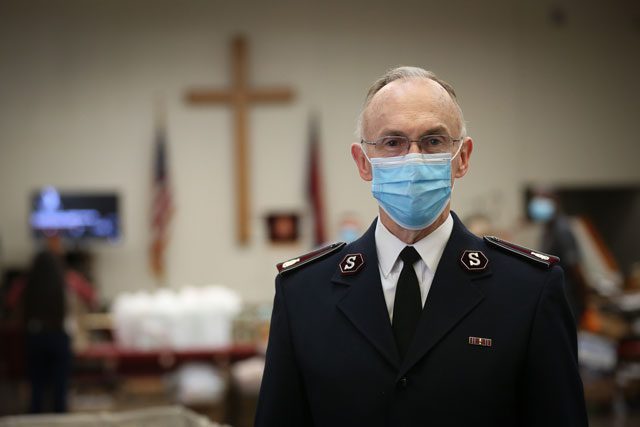Territorial Commander Commissioner Kenneth G. Hodder and Territorial Social Services Director Sabrina Kiser provide an update on the Army’s COVID-19 response.
By Karen Gleason –
To listen to the meeting, please click play below:
Audio Player
The Salvation Army Western Territory held a virtual Town Hall April 21 to update supporters on the Army’s response to the COVID-19 pandemic. During the event—a 20-minute teleconference—Territorial Commander Commissioner Kenneth G. Hodder provided the update to many of the 85,000 individuals who had been contacted and asked to join the call. Lt. Colonel Kyle Smith, Territorial Secretary for Communications, served as moderator, and Sabrina Kiser, Territorial Social Services Director, shared what she has been seeing on the frontlines.
The audience included advisory organization members, Salvation Army officers, corporate and foundation donors and individual donors.
In addition to hearing the update, the audience was able to submit questions. Smith fielded the questions and presented them to Hodder and Kiser for answers. Attendees could also participate in two poll questions. The first was an opportunity to request prayer. By pressing different numbers on the phone keypad, they could ask for prayer for family or loved ones, for employment or financial concerns, or for personal health or a family member’s health.
Hodder began the update by thanking the donors.
“You are truly the army behind the Army,” he said. “The Salvation Army could not accomplish its work without your support.”
He referred to the COVID-19 crisis as “truly a disaster without edges,” and noted that it is a “pandemic overlaid on an epidemic of homelessness here in the Western United States.” While it’s a significant problem, he reported that The Salvation Army is addressing the situation “efficiently, effectively and entirely without discrimination.”
Three keys to the Army’s effectiveness in the current crisis, Hodder said, are its geographic footprint as the largest non-governmental provider of social services in the country, the fact that it’s a direct service provider, and the fact that its services are comprehensive, meeting physical, emotional and spiritual needs.
Kiser thanked the Army’s frontlines social services staff, who are committed to caring for others during this time, particularly those people experiencing homelessness and seniors.
She said her motto of late has been, “Desperate times call for creative measures,” and shared some of the ways the Army is serving now, while maintaining safety protocols. One of the creative services is the SilverLine, a phone number seniors who are feeling isolated can call to speak with someone for encouragement. Another way—among many—the Army is helping during this crisis is by managing hotels and motels for individuals experiencing homelessness.
During one distribution of food to seniors, Kiser asked the program director what was different about this distribution. The director responded that individuals were there for more than food; they were coming “for encouragement, for hope and to know that people care and are there to help.”
Smith presented some of the submitted questions, which included, “What is the most urgent need The Salvation Army has in addressing the current crisis?’ Hodder responded that the financial need is the most pressing; donations are needed so the Army can meet people’s needs. Another person asked about the greatest challenge, which Hodder said is trying to address the full spectrum of human need—physical, psychological, emotional, spiritual—when so many are in need right now.
Kiser responded to a question about how the Army is keeping people in shelters safe. She said the Army is adhering to proper and enhanced hygiene protocols, providing food in to-go containers and making sure staff have the PPE they need. She said beds had been moved to ensure they are six feet apart.
She also responded to a question about what the Army is doing to help meet needs at hospitals and medical centers. The Army is providing child care for first responders and medical staff along with locations for these frontline workers to take showers and change clothes before they return to their homes.
One person submitted an expression of gratitude: “Thank you for sharing. I’m a supporter.”
Some callers submitted questions requiring personal answers, and Smith assured them they would receive follow-up calls. Hodder reached out to those on the line who might feel isolated themselves, and invited them to call the SilverLine (844-458-HOPE).
Others asked how they could help. The best way, Hodder reiterated, is with a financial donation.
In closing, Hodder thanked the Army’s supporters and vowed to live up to The Salvation Army’s promise to “do the most good” with their donations.
“The Salvation Army is going to continue to do everything we can to help as many people as we can in this crisis,” Hodder said. When the crisis recedes, he assured listeners that “The Salvation Army is still going to be here…We’re in this for the long haul.” He closed by quoting General William Booth’s famous “While women weep” speech.
Smith closed the meeting in prayer.
HOW TO HELP:
- If you’d like to make a monetary donation, please click here to make a gift.
- Text ‘GIVE’ to 52000 to make a $10 donation to The Salvation Army. This will automatically add a one-time donation to your next mobile phone bill.
- For information about volunteering, please visit volunteer.usawest.org.
- To learn more about how to support The Salvation Army’s relief efforts, please click here.













